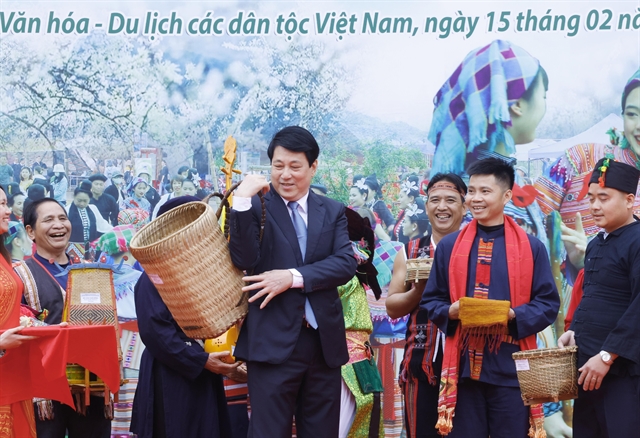 Politics & Law
Politics & Law

 |
| State President Lương Cường attends the festival. — VNA/VNS Photo |
HÀ NỘI — The traditional cultures of 54 Vietnamese ethnic groups are an invaluable asset and a precious resource for the building of a strong and prosperous Việt Nam, State President Lương Cường has said.
The leader made his remarks at an annual festival honouring the traditional cultural values of the 54 ethnic groups, held at the Vietnam National Village for Ethnic Culture and Tourism in Đồng Mô, Hà Nội’s outlying Sơn Tây Township, on Saturday.
This year's edition saw the participation of more than 200 representatives of village elders, community leaders, intellectuals, and artisans from 28 ethnic communities. Among attendees were those of ethnic groups such as the Si La, Kháng, Hà Nhì, and Cống in Lai Châu Province, as well as the Lô Lô, Bố Y, Pà Thẻ, and La Chí in Hà Giang Province. Also present were members of ethnic groups residing in the village, including the Dao, Tày, Nùng, Mường, Thái, and Lào.
In his speech, President Cường underscored that Việt Nam is a multi-ethnic nation, with each ethnic group contributing its own rich and unique cultural value. One of the most significant values of this diverse traditional cultural tapestry is the spirit of great unity and mutual support, which has been a vital force enabling the nation to overcome challenges throughout its history – from the past national construction cause and struggles for liberation to today’s national development and protection.
The State leader stressed that fostering and strengthening national solidarity is a strategic, consistent, and crucial policy of the Party and State, upheld throughout Việt Nam's revolutionary history and modern era to ensure its rapid and sustainable development in a time of the nation's rise towards growth and prosperity.
He called for continued research, issuance, and effective implementation of ethnic policies to protect the rights and improve their material and spiritual lives. President Cường also stressed the importance of preserving and promoting their cultural values, particularly by recognising and honouring the contributions of artisans, village elders, and community leaders.
On this occasion, the President presented gifts to representatives of ethnic communities attending the festival. In return, they gave him their unique cultural items as a gesture of appreciation.
Following the festival, President Cường participated in a tower-opening and incense-offering ceremony of the Chăm people residing in the southern province of Ninh Thuận.
The tower-opening ritual, also known as Peh Bi mbeng yang, is an annual tradition and involves offerings to deities, praying for favourable weather, good health, and the community's permission to commence agricultural activities such as dam building and plowing.
During his visit to the Mường ethnic village within the venue, the President attended their Khai Hạ (going down to the field) festival, a traditional event linked to wet rice cultivation and the ancient Vietnamese civilisation.
The festival honours deities, commemorates ancestors who established the Mường land, and prays for abundant harvests, prosperity, and happiness. In 2022, the Khai Hạ festival of the Mường ethnic group in the northern province of Hòa Bình was recognised as a national intangible cultural heritage. — VNS




